Blog •
Posted on Jul 09, 2021
What Are Book Marketing Jobs and Where Can You Find Them?
About the author
Reedsy's editorial team is a diverse group of industry experts devoted to helping authors write and publish beautiful books.
More about the Reedsy Editorial Team →Out of all the marketing niches you could work in, book marketing certainly sounds like a lot of fun. But what exactly do book marketing jobs entail? Can you move into the publishing industry with experience in other kinds of marketing? Where and how can you make such a transition? Worry not — the answers to all these questions can be found right here, with the expertise of some wonderful marketers working on Reedsy.
What does a book marketer do?
Marketing a book includes many different tasks, and oftentimes, a freelance marketer is hired to help out with one or two aspects of this massive project. What you end up working on differs with every job since every author has a specific set of needs — so having an extensive discussion with the author will always be your first step. Then, you can identify the client’s needs and offer the appropriate service at that moment in time.
Some marketers, like Amanda Lee, chose to focus on a specific area — metadata optimization — whether she’s working in a publishing house or as a freelancer. Others, like Tara Lewis, prefer to focus on big picture concerns. Let’s take a closer look at all the different tasks of a book marketer so that you can make a decision about what suits you. (Note that in this post, we’re focused on freelance book marketing!)
Pro-tip: If you’re not yet familiar with the ins and outs of book marketing, we recommend downloading (for free!) and reading Reedsy’s co-founder’s book — How to Market a Book — to get a well-rounded idea of the job.
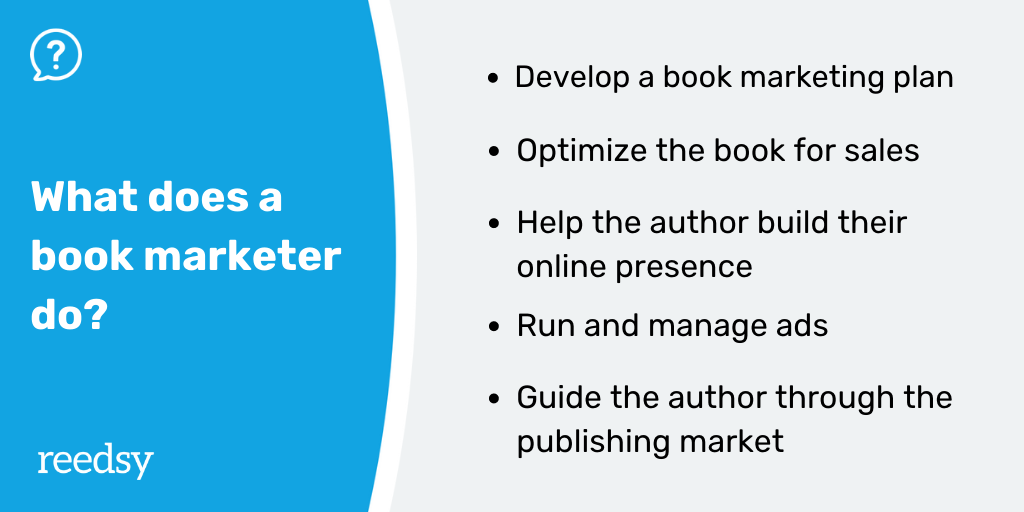
Develop a marketing plan with the author
Many marketers would agree that book marketing is a multifaceted project: it often begins with perfecting the product itself, then to distribution and ads, and then to building online presence and working towards a long-term marketing effort. Of course, as a marketer, you won’t be obliged to manage every single aspect for the author. What you can do is give them the framework with which they can grow their own strategies, or what Tara calls a “rock-solid and easy-to-understand marketing plan that covers all the bases.” These bases usually include:
- Doing market research and locating the book’s target market;
- Getting an up-to-standard book cover with effective front and back matters;
- Writing a winning book description and nailing the metadata;
- Setting up a website or online accounts to build an author presence;
- Finding the appropriate online and offline promotional strategies; and
- Creating, scaling, and managing ads.
This plan mainly gives the author a full idea of the processes needed to successfully market their book. You’ll also be explaining to the authors how each task contributes to the visibility and sale of their books. And then, depending on the specific terms of your agreement, you might work on setting up some basic elements together as well.
For instance, when working with a new author who doesn’t have a clear idea of what their target market is and how to succeed in that segment, beyond devising a plan, you might help suggest a suitable designer, re-write the book description and metadata, and help set up a basic author website or social media account. Any service beyond those basic elements would be a new service that warrants a new agreement and payment.
Optimize the book for sales
Now, onto the specifics. Some authors may only require help in handling metadata, especially on platforms like Amazon. Coming into book marketing from digital marketing, Shaun Loftus learns that for books, success begins with the fundamentals:
- A professional and appealing book cover;
- Front and back matter that converts casual browsers in readers and fans;
- An effective book description that intrigues readers; and
- Correct keywords and categories.
The first three elements contribute to how well the book page convinces potential readers to buy the book. The final element boosts its visibility on the marketplace.
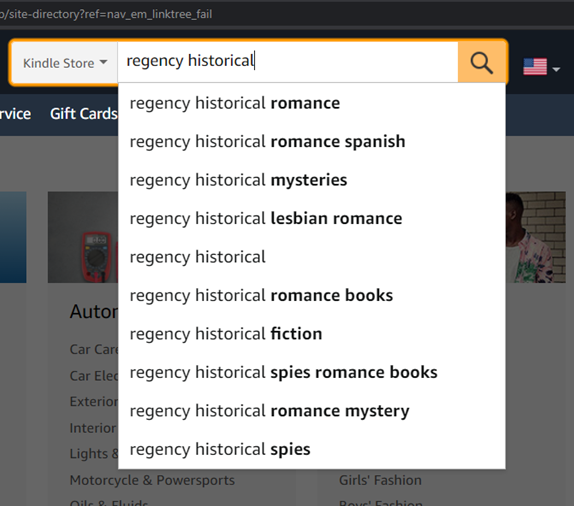
If you’re offering this kind of service, you’ll first have to do an Amazon audit, going over everything that the author has put together for the book in terms of metadata and descriptions. After getting a clear idea of where everything stands, you can make your recommendations, help the author coordinate with book designers, and write the copies for the book front and back matter as well as the description.
Help the author establish and use their online presence
For anyone wanting to build a good long-term author career, some kind of online presence is essential. It’s a way to induce loyalty from readers, whose community can be used to create look-alike groups that will be the ideal target for ads. And while building this online identity is natural for some authors, others may find it baffling — which is where you might come in.
On this, Shaun Loftus says: “We make sure our authors have Facebook business accounts and BookBub accounts, and if not, we set these up for them. We help the author start populating their Facebook page if necessary — because having an audience of Facebook is fundamental once we start advertising there.” If the author has a website, Shaun’s team also helps them build a mailing list and demonstrate how to efficiently use it, via communication strategies and automation.
Another approach, as practiced by Tara Lewis, would be to explain social media digital marketing strategies, along with how they could be used effectively to induce long-term sales. In other words, the book marketer can take more of a backseat when it comes to actually establishing and using these platforms — instead acting as an advisor so that the author is ready to maintain these channels on their own in the long term.
Run and manage ads and promotions
Running ads is potentially the most daunting part of book marketing for most authors — which means that marketers should master this. From creating the material used for advertisements (images, banners, text copies) to monitoring sales, everything is on the table.
For Shaun and her team, it’s about plenty of testing. They try out ads on Amazon, Twitter, Facebook, BookBub, GoogleAds — all depending on the author’s audience. “We build dozens of keyword lists for AMS advertising and work within the author's budgets, and then we monitor them carefully to scale the ads properly. At each step of the way, we test, review, and make appropriate changes to generate sales.”
On top of ads, you also have campaigns that may involve listing the author’s book on promotional newsletter services like BookBub, as well as coordinating sponsorships and cross promotions.
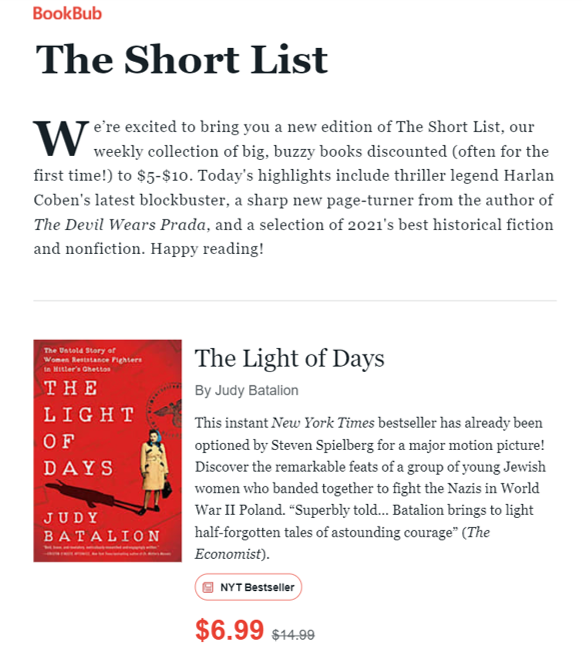
Guide the author through the publishing market
The constant thread going through all of these tasks is the marketer’s role as a guide for the author. Either through collaborating on a marketing plan, an ad campaign, or just through a one-off consultation, book marketers always aim to provide the necessary information to guide authors through the choppy waters of selling their books. With so many published titles to compete with and often a small budget, self-published authors need this support more than anything.
Regardless of your chosen specialty, guidance is built on thoughtful consideration for the author’s time, budget, and energy. Every author will be able to afford a different amount of each, so it’s a very close relationship that you’ll have to create with the writer. But that’s also a pro of freelance book marketing, in Tara’s opinion: “It’s exciting and rewarding to be inventive about how to tailor each book’s marketing plan so that it is easy to understand and implement, not expensive, and successful.”
Q: How do marketers tailor a book marketing plan to an individual author’s goals and genre?
Suggested answer
It really depends on what the author wants to achieve. Some people just want to cross “publish a book” off their bucket list—and that’s great! For them, we keep things simple and practical. The focus is on getting their book out there without making it overly complicated.
For authors who want to build a career, though, the strategy looks very different. We think about the big picture: Who’s your ideal reader? What’s the plan for future books? How can you keep readers engaged and excited? It might mean building an email list, planning a multi-book launch strategy, or figuring out how to market consistently over time.
Every author’s journey is unique, and their marketing plan should be too. The goal is to create a strategy that feels manageable and gets them closer to whatever success looks like for them—whether that’s publishing one book or launching an entire career.
Jd is available to hire on Reedsy ⏺
Eager to enter the publishing industry and help books reach the right audience? Find out more in our guide on becoming an effective book marketer!
Where can you get book marketing jobs?
Book marketing jobs seldom get promoted on job boards the way editing gigs or proofreading jobs do. This may be because marketing services are often so specific to each author that clients often reach out to the marketers directly. Luckily, there are some platforms you can use to close the distance between you and prospective clients.
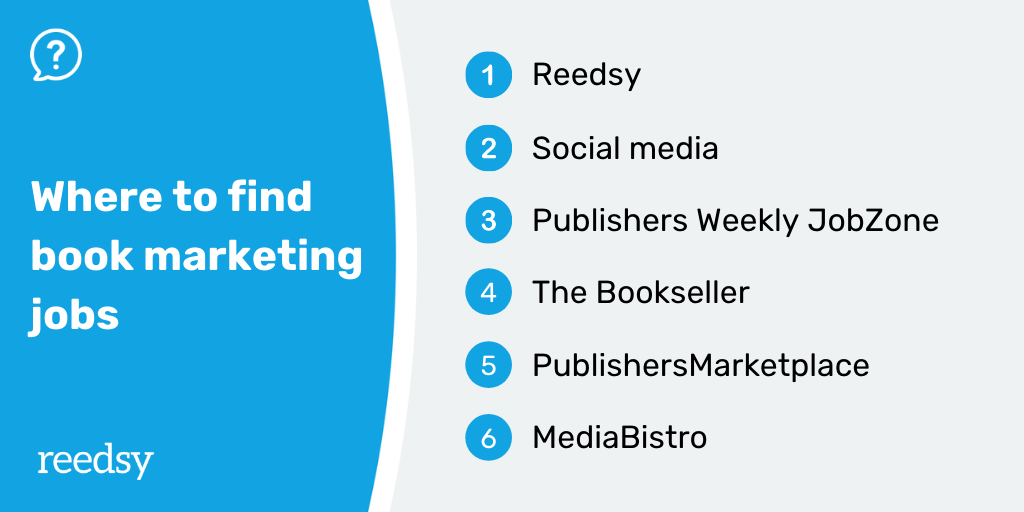
1. Reedsy
Hear it from a marketer herself: Rebecca Berus says that unlike other freelancer or job sites, “Reedsy offers great visibility as it’s geared towards connecting authors with freelancers.”
Reedsy provides a platform for writers to find the publishing experts they need, from editors to designers to marketers. As a freelancer, you only need to complete your profile with your experiences and previous projects, and you’ll be introduced to authors whose genre and needs align with your expertise. There are currently 1,000,000+ writers on this network, so there’s no shortage of job opportunities!
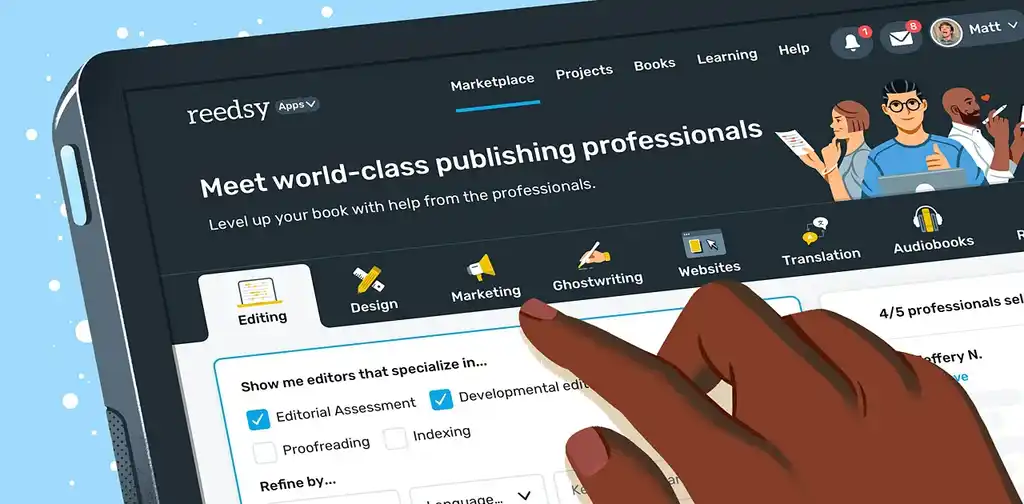
FIND CLIENTS
Grow your business on Reedsy
Submit your application to join our curated network and connect with clients.
Check out marketer Arley Concaildi's story about how they increased their income when they went freelance on Reedsy, or this article on how to price your marketing services for a sense of what you might earn.
2. Social media
In our media-saturated world, freelancers often get numerous good opportunities on social media. Writers aggregate on these sites, often creating groups for their specific genre to share questions and experiences. Joining these groups and offering your take on relevant issues can be a great way to get words out about your services. Common platforms to use are Facebook and Twitter (search up #WritingCommunity, or editor societies). Meanwhile, LinkedIn is good for finding freelance marketing jobs from non-fiction and academic authors.
Pro-tip: Follow us on LinkedIn for tips and insights to the self-publishing industry!
3. Publishers Weekly JobZone
JobZone is the part of the Publisher’s Weekly magazine which shares the latest vacancies in every part of the publishing industry, from small press to educational publishers. It's fairly comprehensive that even includes jobs at agencies, so you’ll often be spoiled for choice.
Note that traditional in-house positions differ from freelance work in the sense that you’ll work to achieve goals set out by publishers rather than the authors themselves. In agencies, you might work with a mix of clients, from publishers to the authors themselves.
4. The Bookseller
More like a traditional job board, The Bookseller offers a constantly updated listing of available book marketing jobs in publishing houses big and small. You can also subscribe to get the newest jobs emailed directly to you.
5. PublishersMarketplace
If you’ve had plenty of experience and are searching for more senior, managing positions in traditional companies, be sure to swing by the PublishersMarketplace job board. They are a lot more relevant to those wanting in-house positions, but they are good opportunities nonetheless.
6. MediaBistro
For some more traditional postings, you can head onto MediaBistro, which is catered specifically to careers in media industries. There will be some results for TV studios or news businesses mixed into your search too, but the screening process could be worth it.
Regardless of where you choose to find these jobs, remember to put together a professional profile and portfolio that demonstrates your expertise and enthusiasm. And who knows, the next best seller might be waiting for you right around the corner!
Reviewed by Linnea Gradin
The editor-in-chief of the Reedsy Freelancer blog, Linnea is a writer and marketer with a degree from the University of Cambridge. Her focus is to provide aspiring editors and book designers with the resources to further their careers.
As the editor of Reedsy’s freelancer blog and a writer on the Reedsy team, Linnea has her hand in a bit of everything, from writing about writing, publishing, and self-publishing, to curating expert content for freelancing professionals. Working together with some of the top talent in the industry, she organizes insightful webinars, and develops resources to make publishing more accessible to writers and (aspiring) publishing professionals alike. When she’s not reading, she can be found dribbling on the football pitch, dabbling in foreign languages, or exploring the local cuisine of whatever country she happens to be in at the time.

